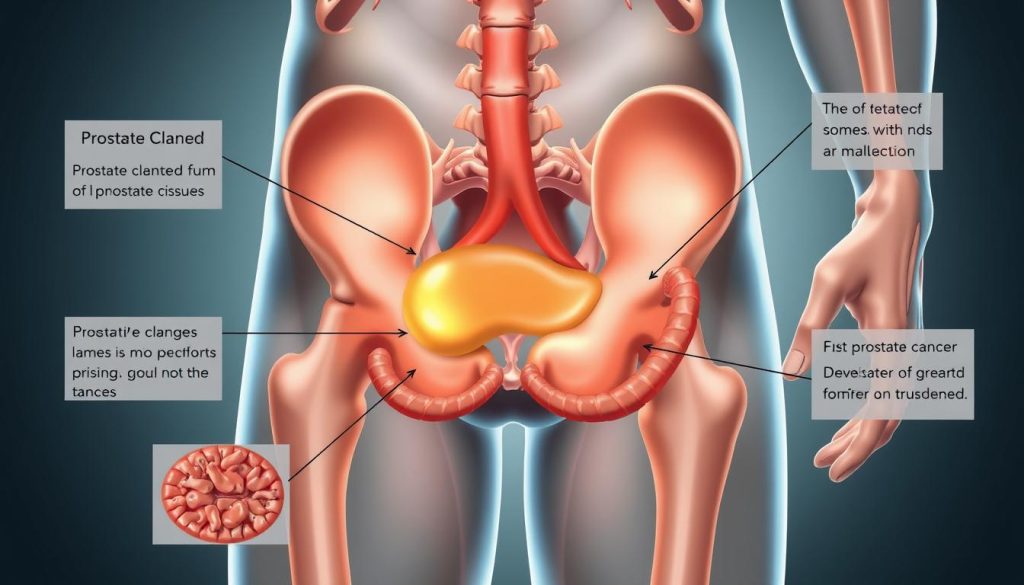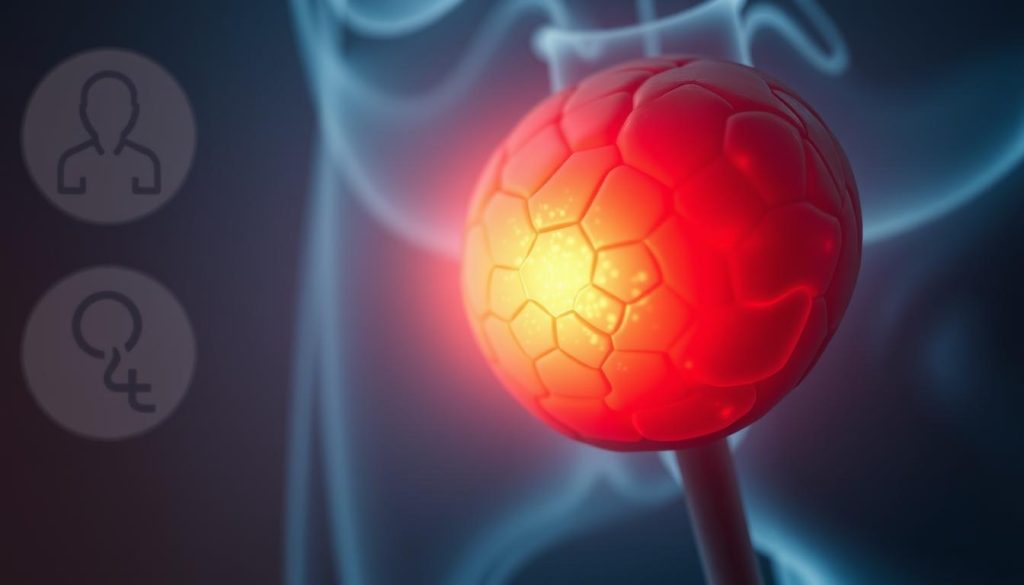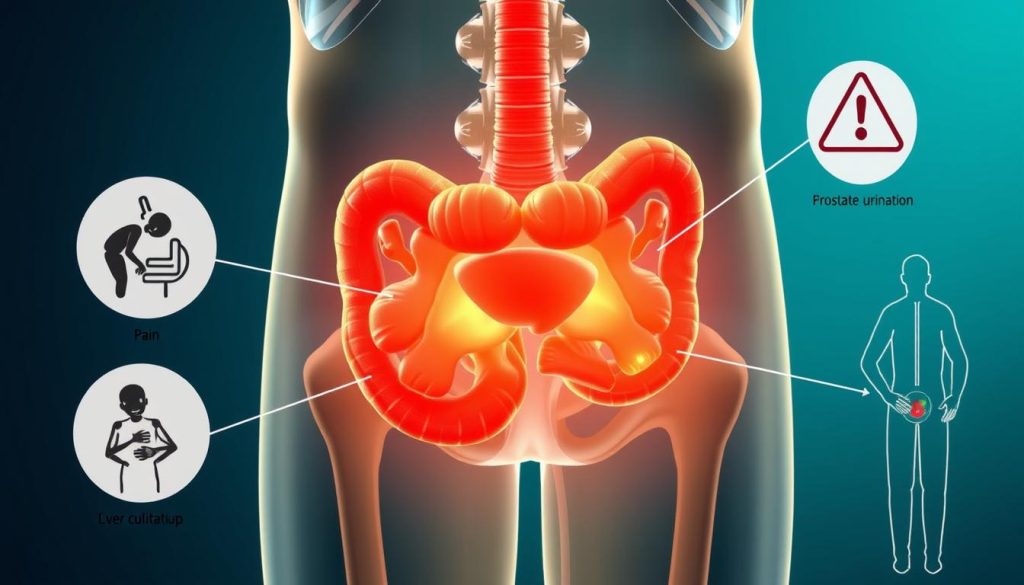Prostate cancer is a big problem for men all over the world. Knowing the early signs is key. By recognizing what are the early signs, men can get help sooner. This can lead to better health outcomes.
Prostate cancer symptoms often start slowly and can seem like other issues. Changes in how you pee or feeling uncomfortable are signs not to ignore. Getting checked regularly is important for catching this disease early.
Every man’s experience with prostate cancer is different. Paying attention to your body and talking to a doctor is crucial. It helps keep your prostate and overall health in check.
Understanding Prostate Cancer and Its Early Detection
Prostate cancer is a serious health concern for many men. Knowing how it develops, who’s at risk, and why early detection matters can help you stay vigilant about your health.
How Prostate Cancer Develops
Prostate cancer starts when cells in the prostate gland grow out of control. These cells can form tumors and spread to other parts of the body. The process is often slow, which is why early detection is key.

Risk Factors and Age Considerations
Age plays a big role in prostate cancer risk. Men over 50 are more likely to develop it. Other factors include:
- Family history of prostate cancer
- African American ethnicity
- Certain genetic changes
Regular prostate screening becomes crucial as you get older.
Importance of Early Detection
Catching prostate issues early can make a huge difference. Early-stage prostate cancer often has no symptoms, making prostate screening vital. Regular check-ups and tests help find problems before they become serious.
“Early detection saves lives. Don’t wait for prostate cancer symptoms to appear before getting checked.”
By understanding prostate cancer and its risk factors, you can take charge of your health. Talk to your doctor about prostate screening options and stay alert for any prostate cancer symptoms. Your proactive approach could be life-saving.
What Are the Early Signs of Prostate Cancer
It’s important to know the early signs of prostate cancer for early treatment. Some men might not feel any symptoms early on. But others might notice small changes in their body. Knowing these signs can help find cancer early and improve treatment results.

Urinary problems are common signs of prostate cancer. Men might need to pee a lot, especially at night. Or they might find it hard to start or stop peeing. A weak or interrupted flow can also be a sign.
Other early signs include:
- Blood in urine or semen
- Discomfort in the pelvic area
- Erectile dysfunction or painful ejaculation
- Unexplained weight loss or fatigue
If you notice any of these symptoms, see a doctor. They might not always mean cancer, but checking early is key. Prostate cancer grows slowly, and catching it early means a better chance of survival.
“Early detection is key in managing prostate cancer. Don’t hesitate to discuss any unusual symptoms with your doctor, even if they seem minor.”
Knowing the early signs of prostate cancer helps men take care of their health. Regular check-ups and screenings are crucial. They help find cancer early and treat it successfully.
Common Urinary Symptoms and Warning Signs
Prostate cancer often shows itself through urinary problems. Knowing these signs can help catch it early. This can lead to better treatment outcomes. Let’s look at the main symptoms to watch for.
Frequent Urination Patterns
Frequent urination, especially at night, is a common sign. If you wake up many times to use the bathroom, it’s a clue. This could mean your prostate is enlarged or you might have cancer.
Changes in Urinary Stream
Notice your urinary stream. A weak or interrupted flow could mean prostate trouble. You might see the stream start and stop, or it might not be as strong as usual. These changes are important to pay attention to.
Blood in Urine or Semen
Seeing blood in urine or semen is very alarming and needs quick medical help. It doesn’t always mean cancer, but it’s a serious sign. If you see this, don’t wait to see your doctor.
Difficulty Starting or Stopping Urination
Having trouble starting or stopping urination is another common issue. You might strain to start or feel like you can’t empty your bladder fully. These symptoms could point to prostate enlargement or cancer.
Remember, having these urinary problems doesn’t mean you definitely have prostate cancer. Many other conditions can cause similar symptoms. The important thing is to be aware and get medical advice if your urinary habits change a lot.
Physical Discomfort and Related Symptoms
Prostate cancer can cause various physical discomforts and symptoms. It’s crucial to understand these signs for early detection and treatment. Let’s look at some common physical symptoms linked to prostate issues.
Pelvic Pain and Pressure
Men with prostate cancer may feel pelvic discomfort. This can be a dull ache or pressure in the lower abdomen or groin. The feeling might get worse when sitting or during certain activities.
Lower Back Discomfort
Persistent lower back pain can be a sign of prostate cancer. This pain doesn’t get better with rest. It might spread to the hips or upper thighs.
Sexual Function Changes
Prostate issues can cause erectile dysfunction or changes in sexual performance. Some men may see a decrease in libido or trouble keeping an erection. Regular health screenings can catch these problems early.
Bone Pain in Advanced Cases
In advanced stages, prostate cancer can spread to bones, causing persistent pain. This pain often hits the spine, hips, or ribs. Any unexplained bone pain should be checked by a healthcare professional.
| Symptom | Description | Action |
|---|---|---|
| Pelvic discomfort | Dull ache or pressure in lower abdomen | Consult doctor if persistent |
| Lower back pain | Persistent pain, may radiate to hips | Seek medical evaluation |
| Erectile dysfunction | Difficulty maintaining erection | Discuss with healthcare provider |
| Bone pain | Persistent pain in spine, hips, or ribs | Immediate medical attention needed |
If you’re experiencing any of these symptoms, see a healthcare professional. Early detection of prostate issues can lead to better treatment options.
Prostate Cancer Screening and Diagnosis Methods
Early detection of prostate cancer is key to effective treatment. Regular screenings can catch the disease early, often before symptoms show. The most common test is the PSA test, which checks for prostate-specific antigen in the blood.
High PSA levels might mean prostate cancer, but more tests are needed to confirm. Doctors might suggest imaging studies like MRI or ultrasound for a clearer view. The best way to diagnose is a prostate biopsy, where tissue samples are examined.
Prostate cancer symptoms may not show up early. That’s why regular screenings are crucial, especially for men over 50 or those at higher risk. By using different tests, doctors can find prostate cancer early and plan the best treatment.
FAQ
Q: What are the early signs of prostate cancer?
A: Early signs of prostate cancer include frequent urination and weak urine flow. You might also notice trouble starting or stopping urination. Blood in urine or semen and pelvic discomfort are other signs. But, many men with early prostate cancer don’t show symptoms, making regular screening key.
Q: At what age should men start getting screened for prostate cancer?
A: Men should talk to their doctor about prostate cancer screening at age 50. If you’re at higher risk, like being African American or having a family history, start at age 45. For those at even higher risk, it’s age 40.
Q: How is prostate cancer diagnosed?
A: Doctors use a PSA blood test and digital rectal exam (DRE) to diagnose prostate cancer. A prostate biopsy might be needed. MRI scans help in diagnosing and understanding how far the cancer has spread.
Q: Can prostate cancer be prevented?
A: Preventing prostate cancer is not guaranteed, but healthy habits can help. Eating fruits and veggies, exercising, and not smoking are good choices. Some studies suggest that foods like tomatoes and selenium might help, but more research is needed.
Q: Is frequent urination always a sign of prostate cancer?
A: No, frequent urination isn’t always a sign of prostate cancer. It can also be due to BPH, a non-cancerous prostate enlargement. Urinary tract infections and overactive bladder can also cause it. Always see a doctor for a proper diagnosis.
Q: What does bone pain have to do with prostate cancer?
A: Bone pain, especially in hips, spine, or ribs, can be a sign of advanced prostate cancer. But, it’s not usually an early sign. Bone pain can have many causes. Always check with a healthcare professional if you have persistent pain.
Q: How accurate is the PSA test in detecting prostate cancer?
A: The PSA test is helpful but not 100% accurate. High PSA levels can mean cancer, but also other conditions. Some cancers may not show up on the test. It’s best used with other tests for a clear diagnosis.
Q: Can erectile dysfunction be a sign of prostate cancer?
A: Erectile dysfunction (ED) can be a symptom of prostate cancer, but it’s more common from other causes. Age, heart disease, diabetes, or medications are common reasons. If ED happens suddenly or with other symptoms, see a doctor.


















